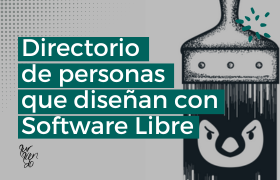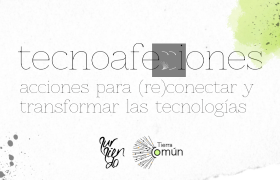Reasons to inhabit the Internet
<autonomies>
We co uld think of a hole variety of topics around which to think our autonomy. Suddenly this interconnected (growingly so) society in which we live, puts communications on the front line. And on a daily basis most of those interconnections go about on line.
uld think of a hole variety of topics around which to think our autonomy. Suddenly this interconnected (growingly so) society in which we live, puts communications on the front line. And on a daily basis most of those interconnections go about on line.
Then we ask ourselves, what is the Internet?, and what isn’t it? The debates around the multiple spaces it crosses, its architecture, contents, finger prints, is very interesting. But to begin with, we think that the Internet is part of the real world and that is why we are interested in inhabiting it.
There is an ongoing number of things that are happening on a daily basis through the web, is this enough reason to inhabit the Internet? According to the Spanish Real Academy maybe it is enough, because inhabiting means living in. But on wikipedia we find the significance of this word increased explaining that “Now a days, the concept of inhabiting has become broad, it has no limits, it is mutable and creative per se (…) The appropriation of places is in making them: inhabiting them in conformity with the dignity of the people”.
It’s poetic and not less beautiful that the definition involves the word dignity. This is how we want to (re)inhabit the Internet.
Historically the web was born as a net of designed computers aiming to permit communication between users. It was horizontal. But its development started taking other paths and today we live a process of great centralization. Few are the suppliers that provide the service and, as well as in other areas of this system, this makes the asymmetry of power larger. For the Internet Society “the key of Internet is that its decentralized architecture maximizes the power of the individual users when it comes to choosing (or creating) and using hardware, software and the services that best satisfy there needs. If we want the Internet to continue being a platform for innovation and creativity, it is necessary to preserve its open and decentralized nature”. Nevertheless “the big Internet companies have been successful in making us believe that the Internet is a ‘public space’ when in reality its an algebraic representation of private services” says Julia Powels and Enrique Chaparro. They furthermore add that the notion of public space is fundamental for a democratical community oriented regime.
It’ s been a while now since we have reached the point where the communication technology is being developed predominantly by big corporations, meanwhile having other projects that contribute by adding value and knowledge in these fields being criminalized by these same powers. Developing open and free technologies that respect privacy and the rights of the users can be considered (more frequently than we would hope) a crime.
s been a while now since we have reached the point where the communication technology is being developed predominantly by big corporations, meanwhile having other projects that contribute by adding value and knowledge in these fields being criminalized by these same powers. Developing open and free technologies that respect privacy and the rights of the users can be considered (more frequently than we would hope) a crime.
We need to reconquer, reapropiate the Internet, each of us from our own knowledge but aiming toward the open, free and collaborative. This is a physical and social space as many others that cross our lives. If we do not decide how we want it to be, others will decide for us.
Inhabit the Internet means to think it, make it, build it and defend equal possibilities of access and development. Between us all we make the web. There are layers and mediators, yes, but there are also who of us (even as users) contribute and make the Internet. We want to keep the capacity of speaking and connecting with many without any one deciding for us when and how to do so. In the same manner we want to share and interconnect our knowledge and thoughts. Or at least have the possibility to do so.
The themes and problematics surrounding the Internet are varied and many. In these days, the neutrality of the web has occupied more tan a comment, blog or article. On February 26th in the United States, the Federal Communications Committee (FCC) will decide new rules applicable to the Internet, so different grass root organizations are calling for #DontBlockMyInternet. An action both virtual and on-site that seeks to reinforce the defense for the webs neutrality.
But  finally, could this decision affect us here in Mexico? Directly or indirectly, the answer is yes. First of all because a great deal of the Internet’s physical infrastructure goes through the land of our northern neighbor’s country. Secondly because the “contagious effect” of this kind of legislations is practically viral. Either way, we will have to bring the struggle in these territories as well. Of the many voices that have discussed the subject we feel very akin to what Alejandro Pisanty refered to in “Diálogos sobre gobernanza en Internet en México” (Dialogues about governance on Internet in Mexico), treating it as a indisputable fiction because, as it has been said more than once, neutrality is what permits, among other things, true innovation.
finally, could this decision affect us here in Mexico? Directly or indirectly, the answer is yes. First of all because a great deal of the Internet’s physical infrastructure goes through the land of our northern neighbor’s country. Secondly because the “contagious effect” of this kind of legislations is practically viral. Either way, we will have to bring the struggle in these territories as well. Of the many voices that have discussed the subject we feel very akin to what Alejandro Pisanty refered to in “Diálogos sobre gobernanza en Internet en México” (Dialogues about governance on Internet in Mexico), treating it as a indisputable fiction because, as it has been said more than once, neutrality is what permits, among other things, true innovation.
The other edge comes, once again, from Edward Snowden. Now that the documentary which addresses the path of the NSA filtrations won an Oscar maybe, only maybe, we can start speaking seriously about privacy on the web without someone coming out saying “it doesn’t really matter, if I don’t even have anything to hide”.
To start off, privacy is a right. Even more, its a right that enables the exercise of other rights. If not, how is liberty of expression possible under a regime of constant and simmering surveillance? As Jacob Appelbaum says, “when we loose privacy we loose action, we loose liberty in itself because we do not feel free any more to express our thoughts”. It makes us less free as societies. It puts us in a place of submission and manipulation.
We live moments of such incongruence that the discourses that defend massive surveillance demand that even our most intimate spaces be public, while they preform there public activities in private. Up to where we remember, one of the basis of democracy is the public character of public events, not the other way around.
Privacy is an individual right, yes, but it can affect others. It should be each one of us who has control of our private information that is wondering around. As it has been said many other times, information is power and now that we have more than enough proofs that information is being recollected by security agencies and mediators we can see quite clearly the power that this can have over our daily lives. Present or future. Because any saved data can be used at any time.
Why do we want to inhabit the Internet? Because on the Internet we spend a great part of our time. Because we want a space of freedom and equality to relate in. Because we want to continue building and making it our own. Of course it is not an ideal space but we also want to inhabit it in order to take care of it. We want to do so from the same logic it was created: free, open and collective in order for it to help in the construction of many other…
</autonomies>




